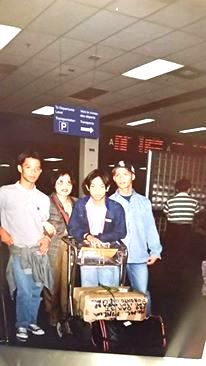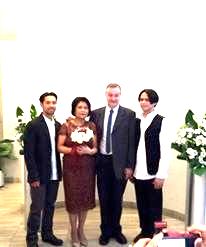They came to Canada with milk boxes for luggage
SAN FRANCISCO — Unlike other Filipino children who were petitioned by their parents in Canada and in the United States, who were prepared with branded luggage and already knew how to speak English, these three brothers had none of these advantages. Their few belongings were packed in milk boxes.
Abner, 17, Renor, 15 and Regalado Pineda, 13, were like bus passengers bound for the provinces instead of being on a flight to Ontario, Canada on June 11, 1995. It was also their first plane ride.
“We were very nervous and excited when we were interviewed at the Canadian Embassy in Manila. It was not easy though, we had to travel from Mindoro to Manila and skipped classes,” says Renor, 38, who now works at Kohl and Frisch, a national distributor of health care supplies in Canada.
“We almost missed our flight when we stopped over in Hong Kong, because we did not have any idea about our flight schedule. We were like castaways. Knowing our predicament, some passengers, also going to Canada helped us,” Abner, 39, a chief clerk at the Metro chain of grocery recalls.
Separated yet close
The brothers had lived in different homes. The youngest, Regalado, grew up at their mother’s family in Paclolo, Magsaysay, Occidental Mindoro. Renor, stayed with their father in another town, while Abner chose to stay in both families and some relatives.
Their parents separated when they were very young, prompting their mother to work abroad. The brothers remained close because at a young age they spent time in their grandparents’ farm in Paclolo.
Renor, remembers that farm life was incomparable to the seemingly convenient life they have had in Canada. He says that they used to walk five kilometers from home to gather wood, spiders and camachile. They also planted and harvested rice, onions and garlic. Sometimes, he would sell spiders in town because “spider fights” were the favorite games of the kids.
Renor’s two sons might frown on these activities, but he wants them to experience the life they had as children in the Philippines.
Life in Canada
The three brothers were petitioned by their mother, Noris Cabrera. She was a longtime nanny in the Middle East before her cousin in Canada sponsored her in 1987. She studied nursing until such time that she was able to petition her three children in the Philippines. During those years, she had not seen her sons until they arrived in 1995.
“Mama lived for a long time in our uncle and aunt’s home. She literally worked day and night so she could send us money, aside from expenses for our grandparents and her siblings. Until now, Mama is paying off debts,” Abner says.
The brothers and their mother stayed for quite some time at a relative’s home in Scarborough. Renor studied until grade 11 and eventually quit because of the cost of schooling. Regalado, finished high school and eventually started working at Royal Canadian Bank. He has twice become a model employee.
“One thing that is good here, they do not discriminate when it comes to education and work. The employers focus more on merit,” says Regalado, 36.
Abner had already finished high school in the Philippines. He did not pursue higher education because of lack of money. They however, all the brothers enrolled in ESL (English as Second Language) classes to hone their English skills. Instead of going to university, Abner immediately looked for work.

Regalado, Noris, Renor and Abner Pineda when the brothers arrived in Canada. “Being a Canadian citizen is not a privilege. We are like every one, anywhere in the world.” CONTRIBUTED
He had just turned 18 then and could work full time. He has been in Metro, his first ever employer, for 20 years now. Abner says that racists are everywhere, but he would tell his supervisor if he was being discriminated on or if heard racist remarks, and those persons would be put in “their proper places,” either reprimanded or fired.
Citizenship
Regalado got his Canadian citizenship after a couple of years. Abner became a citizen only in 2013, while Renor is a permanent resident, though he is married to a Filipina Canadian.
“I do not believe in being a Canadian citizen. When I have enough money, I will go back to our hometown and have a business there. If I become a Canadian citizen, I cannot do business in the Philippines,” Renor says.
Among the brothers, only Abner has not been back to the Philippines since 1995 because he has not applied for a Canadian passport; but he has a citizen’s card. This year, he hopes to get one so he could travel too.
“Now there are lots of Filipinos in Ontario. I’ve met some classmates. Way back, there were just a few migrants,” says Abner.
Renor now lives with his family, while Abner is with his girlfriend so they can both save on rent. Regalado lives with his three kids and partner. Noris, now 60, married her longtime partner, Scott Cunningham, in November 7, 2015.
“We are not special being citizens or residents of Canada. We are just ordinary people making a living, trying to make ends meet and at the same time, thinking of the relatives that need financial help, too. Being a Canadian or Filipino Canadian is not a privilege for us. We suffered distance, the weather and other difficulties. We just survived these all and are still trying to survive life. So much like anywhere in the world,” Abner concludes.
